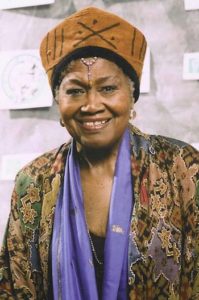
Odetta
*The birth of Odetta is marked on this in 1930. She was a Black folk singer, songwriter, and activist.
Odetta Holmes was born in Birmingham, Ala. Her father, Reuben Holmes, died when she was young, and in 1937, she and her mother, Flora Sanders, moved to Los Angeles. Three years later, Odetta discovered that she could sing. “A teacher told my mother that I had a voice, that maybe I should study,” she recalled. “But I myself didn’t have anything to measure it by.” She found her voice by listening to blues, jazz, and folk music from African American and Anglo-American resources.
She earned a music degree from Los Angeles City College. Her training in classical music and musical theater was “a nice exercise, but it had nothing to do with my life,” she said. “The folk songs were the anger,” she emphasized. In a 2005 National Public Radio interview, she said: “School taught me how to count and taught me how to put a sentence together. But as far as the human spirit goes, I learned through folk music.”
In 1950, Odetta began singing professionally in a West Coast production of the musical “Finian’s Rainbow,” but she found a stronger calling in the bohemian coffeehouses of San Francisco. “We would finish our play, we’d go to the joint, and people would sit around playing guitars and singing songs, and it felt like home,” she said. She began singing in nightclubs; her voice plunged deep and soared high, and her songs blended the personal and the political, the theatrical and the spiritual.
Her first solo album, “Odetta Sings Ballads and Blues,” resonated with an audience that was hearing old songs made new. Referring to that recording, Bob Dylan said in a 1978 interview, “The first thing that turned me on to folk singing was Odetta.” He said he heard something “vital and personal” and added, “I learned all the songs on that record.” It was her first, and the songs were “Mule Skinner,” “Jack of Diamonds,” “Water Boy,” and “Buked and Scorned.”
Her blues and spirituals led directly to her work for the American Civil Rights movement. In her interview with The New York Times, she said they were two rivers running together. The words and music captured “the fury and frustration that I had growing up.” Raised during the Depression, the music of that time and place, particularly prison songs and work songs recorded in the fields of the Deep South, shaped her life. “They were liberation songs,” she said in an interview with The New York Times in 2007 for its online feature “The Last Word.” “You’re walking down life’s road, society’s foot is on your throat, every which way you turn, you can’t get from under that foot. And you reach a fork in the road, and you can either lie down and die or insist upon your life.”
Her fame peaked in 1963 when she marched with the Rev. Dr. Martin Luther King Jr. and performed for President John F. Kennedy. But after King was assassinated in 1968, the wind went out of the sails of the civil rights movement and the songs of protest and resistance that had been the movement’s soundtrack. Odetta’s fame was flagged for years thereafter. 1999, President Bill Clinton awarded Odetta the National Endowment for the Arts Medal of the Arts and Humanities.
Odetta was married to Don Gordon, Gary Shead, and, in 1977, to blues musician Iverson Minter (Louisiana Red). The first two marriages divorced; Minter moved to Germany in 1981 to pursue his performing career.
In April 2007, half a century after Bob Dylan first heard her, she was on stage at a Carnegie Hall tribute to Bruce Springsteen. She turned one of his songs, “57 Channels,” into a chanted poem, and Springsteen came out from the wings to call it “the greatest version” of the song he had ever heard. Odetta Holmes died at Lenox Hill Hospital in Manhattan on December 2, 2008.
Tim Weiner, The New York Times.
Image: Michael Ochs Archives /Getty Images